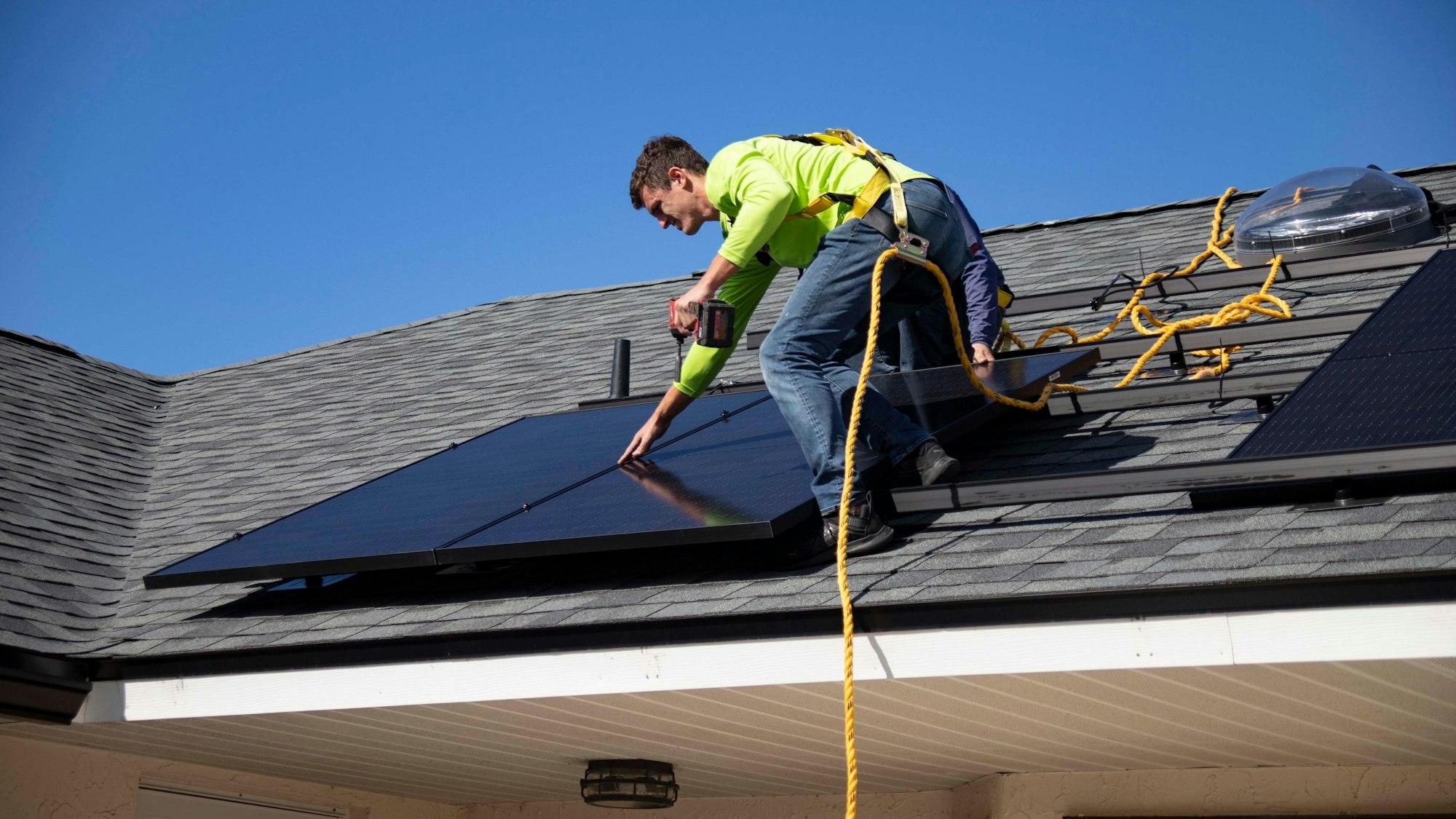Can a House With Solar Panels Use a Generator?
Combining generators with solar panels enhances energy efficiency and reliability, allowing homeowners to meet their energy needs sustainably and flexibly while minimizing costs over time.

Photo by Raze Solar
In an age where energy efficiency is paramount, the integration of generators with solar panels presents an innovative solution to power generation.
Generators and Solar Power
The combination of solar panels and generators creates a robust energy system that can adapt to varying energy needs. Solar power harnesses the sun's energy, converting it into electricity while generators, whether fueled by gasoline, diesel, or natural gas, provide backup power during cloudy days or nighttime.
During peak sunlight hours, solar panels can generate sufficient electricity, often exceeding a household's needs. The excess energy can be stored in batteries or fed back into the power grid. In situations where solar generation is low, such as during inclement weather, generators step in to ensure a continuous power supply.
Moreover, the integration of solar energy with generators not only enhances energy reliability but also promotes sustainability. By reducing dependence on fossil fuels, this hybrid system contributes to lower carbon emissions. Homeowners can significantly decrease their environmental footprint while enjoying the benefits of a stable energy supply. Additionally, many modern generators are designed to operate more efficiently and with lower emissions, further aligning with eco-friendly initiatives.
Another significant advantage of this synergy is the potential for cost savings. While the initial investment in solar panels and generators may seem substantial, the long-term savings on energy bills can be considerable. Many states offer incentives and rebates for solar installations, making the transition to renewable energy even more financially appealing. Furthermore, by utilizing solar energy during the day and relying on generators only when necessary, homeowners can optimize their energy usage and minimize reliance on grid electricity, leading to substantial savings over time.
Comparing Generators and Solar Battery Systems
When considering energy systems, many homeowners find themselves weighing the benefits of generators against solar battery systems. Both options have distinct features and advantages that may cater to different needs.
- Generators: Offer flexibility in fuel sources, can provide high power output quickly, and are often more cost-effective upfront.
- Solar Battery Systems: Allow for energy storage, reducing reliance on fossil fuels, and provide a more sustainable long-term solution.
Ultimately, the choice between the two depends on individual energy requirements, budget considerations, and environmental impacts. Combining both systems can yield an efficient, resilient energy plan.
Generators, particularly portable ones, are favored for their immediate power supply during outages or emergencies. They can run on various fuels, including gasoline, propane, or natural gas, making them versatile for different situations. Additionally, advancements in generator technology have led to quieter and more efficient models, reducing noise pollution and fuel consumption. This flexibility makes generators an attractive option for those who may require power for tools or appliances in remote locations or during outdoor activities.
On the other hand, solar battery systems are increasingly popular as they align with a growing desire for sustainability and energy independence. By harnessing solar energy, these systems not only provide power during the day but also store excess energy for nighttime use or during cloudy days. This capability can significantly lower electricity bills and reduce the carbon footprint of a household. Moreover, many solar battery systems come equipped with smart technology, allowing homeowners to monitor their energy usage and optimize their consumption patterns for maximum efficiency.
Is It Possible for a Generator to Operate on Solar Energy?
While conventional generators rely primarily on fossil fuels, innovative solutions have emerged in the realm of solar energy. Hybrid generators combine traditional generator technology with solar charging capabilities, allowing them to harness solar energy for operation.
These hybrid systems can charge their batteries via solar panels, using stored energy for generator functionality. This approach can drastically reduce fuel consumption and emissions while providing efficient backup power when solar generation is insufficient.
Moreover, the integration of solar energy into generator systems not only enhances sustainability but also offers significant cost savings over time. As the price of solar panels continues to decline, more homeowners and businesses are considering hybrid generators as a viable alternative to traditional power sources. Additionally, many of these systems come equipped with smart technology that optimizes energy usage, ensuring that the generator operates at peak efficiency. This means that users can enjoy the benefits of a reliable power supply while minimizing their carbon footprint.
Furthermore, advancements in battery technology have made it possible for these hybrid generators to store larger amounts of solar energy, extending their usability even during cloudy days or at night. This capability is particularly beneficial for remote areas where access to the electrical grid is limited or non-existent. As the demand for renewable energy solutions grows, manufacturers are continually innovating, leading to more efficient and powerful hybrid generators that can meet the diverse needs of consumers. With the right setup, these systems can provide a seamless transition between solar power and traditional fuel sources, ensuring uninterrupted power supply in any situation.
Powering Your Entire Home with a Solar Generator
Many homeowners ponder the practicality of utilizing a solar generator for all their energy needs. The feasibility of powering an entire home with a solar generator largely depends on the household's energy consumption and the generator's capacity.
To successfully power a home, one must assess the critical appliances and systems that require electricity and ensure the generator can meet that demand. Solar generators are ideal for homes with efficient energy use, but they may require additional battery storage or supplemental power sources for larger energy needs.
Understanding your energy consumption is crucial. For instance, an average home consumes around 30 kilowatt-hours (kWh) per day, which can vary significantly based on factors like the number of occupants, the size of the home, and the efficiency of appliances. By conducting an energy audit, homeowners can identify which appliances consume the most power and prioritize their usage. This not only helps in determining the size of the solar generator needed but also encourages more mindful energy consumption habits, such as using energy-efficient appliances and utilizing natural light whenever possible.
Moreover, the location and climate play a significant role in the effectiveness of solar generators. Homes in sunnier regions can harness more solar energy, making it easier to rely solely on solar power. However, in areas with less sunlight or during winter months, homeowners may need to consider hybrid systems that combine solar with traditional power sources. This adaptability allows for a more resilient energy strategy, ensuring that even during cloudy days or power outages, essential services remain uninterrupted. Additionally, advancements in solar technology, such as improved photovoltaic cells and energy storage solutions, continue to enhance the viability of solar generators for whole-home applications.
Different Types of Generators
The market offers various types of generators, each designed with specific functions and efficiencies in mind. Understanding these generators can help homeowners select the most suitable option for their needs.
- Portable Generators: Great for temporary power needs, especially during outages or for outdoor activities. They are less powerful but highly versatile.
- Standby Generators: Automatically kick in during power outages, providing uninterrupted power. These units are more powerful and can support larger homes.
- Inverter Generators: Deliver clean and stable power, making them ideal for sensitive electronics. They operate more quietly and efficiently.
Each type serves different purposes, allowing homeowners to choose based on their unique circumstances and energy demands.
Options for Solar Panel Installations
The initial investment in solar panels can be daunting, but various financing options are available to alleviate the burden. Homeowners should explore these avenues to facilitate a smoother transition to solar energy.
- Cash Purchase: The most straightforward option but requires a significant upfront investment.
- Solar Loans: Allow buyers to spread payments over time, often with fixed interest rates.
- Leases and Power Purchase Agreements (PPAs): Enable homeowners to install solar with little to no upfront cost by paying for the system over time or for the power generated.
Each financing option carries its benefits and considerations, making it crucial for homeowners to assess which solution aligns best with their financial situation.
Are They a Good Investment?
The cost of solar panels continues to evolve, influencing their viability as an investment. In 2024, average solar installation prices have declined due to technological advancements and increased competition, making solar power more accessible than before.
To determine whether investing in solar panels is financially sound, homeowners should consider potential savings on energy bills, maintenance costs, and local incentives available for solar installations. With proper research and planning, solar panels can yield substantial savings over their lifespan.
The Truth Behind 'Free Solar Panels' Offers
As the popularity of solar energy has surged, "free solar panels" offers have become common. It's essential to understand that while the installation might be advertised as free, these options often involve hidden costs or long-term commitments that may not benefit the homeowner.
Typically, these offers come from leasing arrangements or power purchase agreements. While they can reduce upfront costs, potential customers must scrutinize the terms to avoid unexpected fees and ensure they are making a sound financial decision.
Functionality and Key Insights
Solar batteries have grown in importance as more homeowners look to maximize their solar investments. They enable the storage of excess solar energy generated during the day, allowing users to draw power in the evening or during outages.
Technological advancements in battery technology will make solar batteries even more efficient and affordable in 2025. With increasing storage capacities and longer lifespans, investing in solar batteries not only enhances energy independence but also provides a strategic backup during unpredictable power outages.
In conclusion, the combination of solar panels and generators forms a synergistic relationship that maximizes energy efficiency. By understanding the various systems and financial options, homeowners can make informed decisions that will benefit their energy needs in both the short and long term.
Quick facts
Can you run a generator if you have solar panels?
Yes, you can run a generator if you have solar panels. Many systems use generators as backup power sources when solar energy is insufficient, and they can be integrated into a solar setup with the right equipment and setup.
Can I power my house with a solar generator?
Yes, a solar generator can power a house for short-term needs or essential appliances. Solar generators store energy from solar panels but may have limitations compared to traditional generators, especially for prolonged power needs.
Can you use a Generac with solar panels?
Yes, Generac generators can be used with solar panels. Many homeowners integrate Generac generators with solar systems to provide backup power when solar energy is unavailable, ensuring a continuous power supply.
Can you use a generator and solar panel at the same time to charge your batteries?
Yes, you can use a generator and solar panels simultaneously to charge batteries, provided your system is configured to handle both inputs safely. This setup can ensure continuous battery charging during low sunlight conditions.
Do solar panels eliminate the need for a generator?
Solar panels can reduce the need for a generator but may not eliminate it entirely. During extended periods of low sunlight or high energy demand, a generator can provide additional backup power.
How to hook up a generator to solar?
To hook up a generator to a solar system, you typically use a transfer switch or an inverter that supports dual input sources. It’s best to consult a professional to ensure safe and effective integration of both power sources.

Mihai Crisan
Software Engineer at Spoken
Mihai is a dedicated software engineer at Spoken, where he combines his passion for technology with his professional expertise. As a tech geek, he is always on the lookout for innovative solutions to simplify and enhance people's lives through cutting-edge technology. Mihai’s curiosity drives him to explore and implement new ideas that make a real impact.
Read more